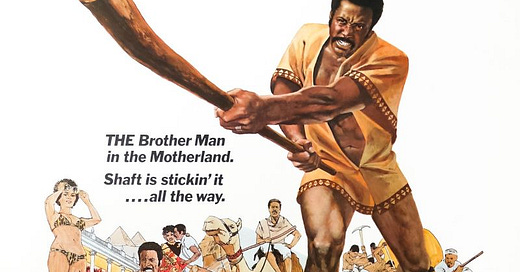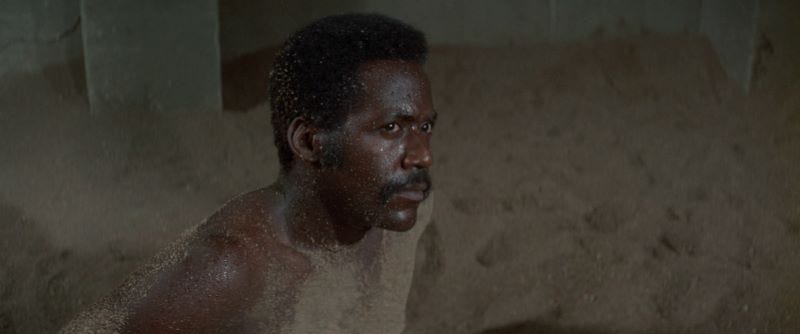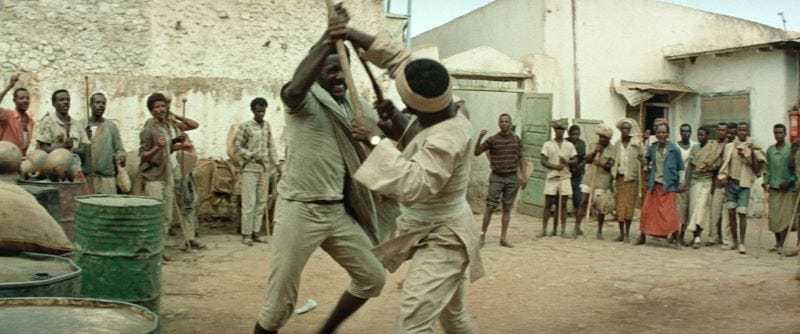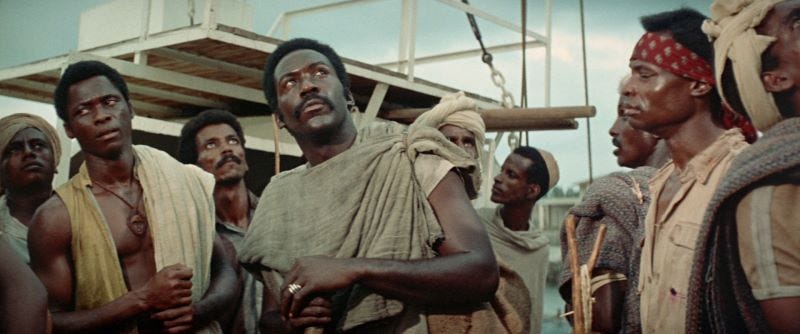Blaxploitation Education: Shaft in Africa
The ultimate urban hero gets so far from his normal setting that he's almost a different character.
Shaft in Africa
Written by Stirling Silliphant
Directed by John Guillermin
1973
If you had to name one Blaxploitation hero who was the top guy, the one that set the standard for everyone else, it would have to be Shaft, right? While Cotton Comes to Harlem was an early example of urban Black action, Shaft seems like the moment when the Blaxploitation the genre really solidified, providing a larger than life hero who moved through his urban setting with swagger, refusing to be intimidated by white cops or mobsters and smart enough to play other characters against each other and come out on top. While the story was enjoyable enough, what really made the movie work was Richard Roundtree’s performance, although the indelible theme song and score by Isaac Hayes certainly didn’t hurt.
Unfortunately, as so often happens when a movie is successful, its sequels failed to recapture the magic. Shaft’s Big Score! was pretty entertaining, and it definitely went big on the action, but it mostly involved Shaft reacting to some plots by mobsters without much use of his street smarts. But still, Richard Roundtree maintained his character’s cool, looking like a badass action hero who got to take down some criminal figures all on his own while firing off quips that made everyone else look like a bunch of idiots.
So where does Shaft go next? More New York City adventures might not work all that well, since a third movie would be unlikely to top the action of the second, and having him go up against some more gangsters and cops would probably start to seem repetitive. The obvious solution would be to put him in a new setting. And since he’s a Black hero who stands up against racism and oppression by The Man, why not have him fight the ultimate force of oppression that has affected Black people? While the third Shaft movie was called Shaft in Africa, it might as well be called Shaft vs. Slavery.
While that seems like it could possibly work in theory, actually coming up with a plot in which Shaft could realistically fight slavery is difficult. That’s partly because Shaft is just one guy who mostly operates at the street level, and having him try to take down forces working on the international scale is just too big of a conflict for him. And while he has some action hero chops, being good at shooting guns or beating up some thugs here and there, he’s not exactly a master of disguise who can easily infiltrate criminal operations in other countries. Send him to Africa to figure out how the slave trade works, and he’s probably going to stand out as an American who is out of his element, making him a fairly easy target for the very people he’s trying to investigate and apprehend.
Making this type of plot work is a tall order, and unfortunately, the filmmakers don’t seem to be up to the job. While Gordon Parks directed the first two films in the series (and wrote the music for Shaft’s Big Score!), he’s replaced this time around by John Guillermin, who had previously focused on action and war movies that have been forgotten in the ensuing decades and would later go on to direct The Towering Inferno and the 1976 King Kong remake. While Ernest Tidyman, author of the original Shaft novel, was involved in writing the first two movies, the screenplay here is by Stirling Silliphant, who was better known for movies like The Poseidon Adventure and, yes, The Towering Inferno. Notably, unlike Parks, both Guillermin and Silliphant were white, making their ability to competently handle topics like the African slave trade somewhat suspect.
And sure enough, the plot they come up with here only touches on these concerns at the most basic level. Shaft gets recruited by the emir of a fictional country bordering Ethiopia to investigate a scheme by powerful criminal figures in which they recruit men from his country, smuggle them into Europe, then force them to work low-paying jobs. But does he simply approach Shaft and try to hire him? No, that would be too easy! Instead, he sends a big thug to bring him in. Shaft, being naturally suspicious, briefly eludes him, but then he just goes home to his apartment, making himself very easy to find. When the man smashes down the door, Shaft shoots him, but the guy is wearing a bulletproof vest, and another guy knocks Shaft out with a tranquilizer dart. Then, they strip Shaft naked and leave him in a stable by some horses. When Shaft wakes up, he finds a staff lying nearby, so he uses it to have a stick fight with the big guy before getting knocked out again. This time, he wakes up locked in a room filled with sand and dozens of bright lights on the ceiling. A speaker informs him that this is to test how well he can survive in a desert environment. He buries himself in the sand, which apparently impresses his captors enough that they let him out so they can give him their pitch, which involves having him pose as a native of their country, volunteer for work, get smuggled into France, and somehow identify the leader of the slavery ring along the way.
This all seems much too convoluted, both from a recruitment perspective and as a way to deal with the slavery problem. They offer Shaft $25,000 for his services, which seems much too low, even in 1973 dollars. While he seems ready to turn them down, he changes his mind when he learns that he’ll be receiving a crash course in the language and customs of the country from the emir’s daughter, Aleme (Vonetta McGee, from Blacula, Melinda, and at least a couple more Blaxploitation movies to come).
Since we know that Shaft is a sex machine with all the chicks, he’s ready to turn on his charm, but he’s stymied by the aforementioned big man, who serves as Aleme’s bodyguard. Also, she cheerfully informs Shaft that due to her country’s customs, she’ll remain a virgin until she reaches marrying age, after which she’ll undergo a clitorectomy. I imagine only a white writer would be so glib about the horrific practice of female circumcision that affects women throughout Africa. It’s treated like something of a joke here, a backwards cultural custom that Aleme later disavows when she threatens Shaft’s mission by driving to meet him in the middle of his journey so they can have sex.
Shaft does head to Africa to get recruited as a slave, but the bad guys almost immediately figure out what’s going on and send various people to kill him. Even though his cover has been blown and he can be easily identified (he wears the same burlap clothing and sandals as the other workers, but he keeps his well-trimmed hairstyle, moustache, and sideburns, and he speaks English to everyone), he manages to get recruited by picking another stick fight with one of the thugs. Even though the movie has a credited stick fight choreographer, these fights are incredibly stilted and awkward, mostly consisting of one guy swinging his stick like an axe and the other guy blocking it by holding his stick out in front of him, then the two of them trying to push each other around for a while.
Anyway, there are various hijinks as Shaft and company make their way to the Mediterranean Sea and board a boat where they’ll be shipped to France. The big bad of this operation, a French guy named Amafi (Frank Finlay, who played Porthos in the 1973 version of The Three Musketeers), decides to send his girlfriend, a nymphomaniac named Jazar (Serbian actress Neda Arneric) to seduce Shaft and set him up to be killed. It doesn’t work of course, since Shaft is so good at sex that he makes her switch sides (she also allows him to deliver one of the only funny lines in the movie; after she asks him how big his dick is, he says it’s shrunk down a bit because he’s under some stress, so it’s only 20 inches right now). After she tells him Amafi’s identity, the two of them try to escape in a dinghy, but she’s tragically killed when the first mate tries to stop them.
When Shaft finally gets to Paris, there’s a little bit more investigating to do, but he tracks down Amafi fairly easily, saves all the workers that Amafi was planning to kill to protect himself from recriminations, and lets those guys murder the villain in an act of righteous mob violence. Slavery problem solved! Now Shaft can head off into the sunset (but actually to a series of TV movies that are reputed to be of pretty low quality).
While I wouldn’t call this a terrible movie, it’s definitely a further step down from the previous entry in the series, which was itself inferior to its predecessor. Richard Roundtree does his best to maintain the character’s aura of cool, but he’s taken so far out of his comfort zone that he’s barely recognizable. Yes, he gets to bed several women (at one point, he and a colleague go to a brothel, and when a woman takes him into her room and takes her top off, he looks at her breasts and says “No wonder they call Africa the mother country.” Come on, Shaft, you know Africa isn’t a country!), and he’s badass enough to take down anyone who tries to get the drop on him, but he just seems out of place. He does get to exhibit some righteous indignation when meeting with a Parisian police detective, informing him that the reason something hasn’t been done about the slavery issue is that it’s too profitable for everyone involved, including the French government.
It should probably also be noted that what Shaft is fighting against isn’t really slavery. Yes, it’s exploitation of workers, but they’re coming of their own free will, and they’re getting paid. They’re really migrant workers. After getting to France, Shaft is outraged to learn that the men will be charged 100 Francs a month to stay in a cheap flophouse, when they only earn a total of 200 Francs each month. That sounds like a much less onerous situation than what many migrants are facing in the United States today. It sounds like we need a Shaft of our own to try to take on the system of exploitation that is destroying the lives of so many people around the world, but it’s not going to be as easy as tracking down and executing a single gangster. And with the biggest crime boss of all about to occupy the White House, there’s little hope of anything being fixed or anyone’s life being made better.
Anyway, I should also note that the music here isn’t too bad, although the score by Johnny Pate consists mostly of what is becoming the default Blaxploitation soundtrack, with lots of guitars making “chicka-chicka” sounds and some horns thrown in here and there. There’s a decent theme song, “Are You Man Enough?” that’s sung by The Four Tops. But as with the rest of the movie, it’s all just diverting enough to keep you fairly entertained without providing anything near the level of quality that should be expected from a Shaft movie. It’s an unfortunate end to the movie series (until it got revived for some legasequels a few decades later), but luckily, there were plenty of others who were willing to step up and take its place.
Blaxploitation Education index:
UpTight
Cotton Comes to Harlem
Watermelon Man
The Big Doll House
Shaft
Sweet Sweetback’s Baadasssss Song
Super Fly
Buck and the Preacher
Blacula
Cool Breeze
Melinda
Slaughter
Hammer
Trouble Man
Hit Man
Black Gunn
Bone
Top of the Heap
Across 110th Street
The Legend of N***** Charley
Don’t Play Us Cheap
Shaft’s Big Score!
Non-Blaxploitation: Sounder and Lady Sings the Blues
Trick Baby
The Harder They Come
Black Mama, White Mama
Black Caesar
The Mack
Book of Numbers
Charley One-Eye
Ganja & Hess
Savage!
Coffy









"Are you man enough?/Big and bad enough?/Are you gonna let 'em shoot you down?"
The song is definitely the best part of the movie- it works very well apart from it, and was deservedly a top 10 R&B and pop hit for The Tops. The arrangement is wonderful and you can actually hear how well the guys harmonized (which wasn't always apparent the way their Motown recordings were mixed...).
Dennis Lambert and Brian Potter do not get nearly enough credit for being one of the great songwriting teams of the 1970s, as they scored big ones across the decade for a wide variety of artists. The movie easily could have been helped if there had been more music for them to do and the Tops to perform which related to the action (as was the case with Isaac Hayes's score for the original film).
I’ve been low-key waiting for you to write about this movie. I bought the DVD to *Big Score* on a whim when I was 16 and it had the trailer for this at the start. That trailer would not exit my mind so I sought it out and watched it soon after and OH MY GOD DID IT EVER JUMP THE SHARK! I love it the same way a father loves his youngest son who has been in and out of rehab too many times.
Excellent write up!